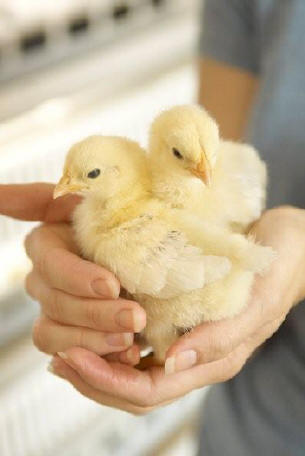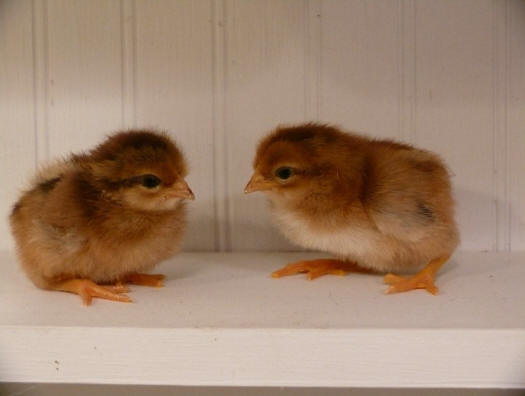William Marrow
Whitmore Farm
(4/1) Peep . . . peep . . . peep . . . it's addictive you know. Sometimes, I'm lying in bed trying to clear my mind to fall asleep, and not think about all the things that I didn't get done on the farm today, or all the new things I need to get done on the farm tomorrow and I'll hear it . .
. peep . . . peep . . . peep. I know it is all in my mind, a residual hum of peeps from my spending so much time in the hatching room. It is impossible for it to be real. I tell myself I am three buildings and 200 yards from the closest batch of chicks. There is a reason old timers call newly hatched chicks
"peeps." That's the sound they make! It's a constant chorus of peeps.
 I'm not kidding. We raise chickens here at Whitmore Farm and hatching season is in full swing. The hatching room is full of chicks, the brooders are full of chicks, and the former milk house is full of chicks. I just
recently annexed a box stall in the barn and filled it with chicks. If you come to visit, and leave your car unlocked for any length of time, you are likely to come back and find it full of chicks. An imaginary line has been drawn around the house and I know if any chicks make it inside, I'll have to find someplace
else to live. You can only push your loved ones so far.
I'm not kidding. We raise chickens here at Whitmore Farm and hatching season is in full swing. The hatching room is full of chicks, the brooders are full of chicks, and the former milk house is full of chicks. I just
recently annexed a box stall in the barn and filled it with chicks. If you come to visit, and leave your car unlocked for any length of time, you are likely to come back and find it full of chicks. An imaginary line has been drawn around the house and I know if any chicks make it inside, I'll have to find someplace
else to live. You can only push your loved ones so far.
Not all peeps are the same. I can walk by a room and tell by the frequency or pitch of the peeping, if they need something. When I first started out, I used to think I was crazy, but then I learned to trust my instincts. Sure enough, every time I thought something didn't sound right, I would
find a chick that got on the wrong side of a divider, a clogged waterer, or a burnt out heat lamp. Now, years later, I can tell by the peeping whether it is the waterer or the heat lamp. It must be some deep, primitive part of the brain, some paternal instinct that is able to discern the fine nuances of infant
sounds that tells me something is wrong, or that everyone is happy. I never intentionally tried to figure it out.

Peep . . . peep . . . peep . . . everyone should have a few chickens. They require far less effort than a dog or cat, once they are grown up, that is. They provide entertainment with their antics. They are trainable and will come to you when you call them. They provide you with fresh,
nutritious food that is better than that commonly found in grocery stores. They eat bugs and table scraps and give you fertilizer, otherwise known as poop. Every gardener would appreciate that! They saved my basil crop last year. I had given up on it because of a huge Japanese beetle infestation. Being an organic
farm, we have a limited arsenal against bugs and tend to just grow things that don't need to be sprayed. Well, once the chickens discovered the Japanese beetles, they patrolled the basil patch like cops in a prison yard! After two weeks, there wasn't a Japanese beetle to be found on the entire farm. I think the
aromatic basil worked like bait, attracting Japanese beetles for miles around. Then the chickens pounced, one-by-one, until they were all gone. A month later, the basil had flushed out again and we had a good harvest!
There has been a renewed interest in maintaining a few chickens in the backyard as pets and a source of wholesome eggs. All sorts of websites have popped up for people to learn about raising chickens in urban and suburban settings. The City Chicken (http://home.centurytel.net/thecitychicken/index.html)
and Backyard Chickens (http://www.backyardchickens.com/) are probably the most popular websites. But there are a number of Yahoo groups as well that cater to specific breeds of chickens or specific neighborhoods in different cities. Where town and local ordinances prohibit keeping chickens, citizen groups are
either petitioning local governments to change the ordinances, or they are taking their chances and sharing eggs with neighbors in exchange for support. If you live outside the city limits, then the county ordinances apply, and in all likelihood you are allowed to have chickens with some restrictions on the number
of birds per acre and the location of the coops. If you follow common sense when siting your coop, make it attractive, and check in with affected neighbors beforehand when in doubt, you should be okay.
I've helped a number of families get started with small backyard flocks. A couple of guidelines I always recommend are the following:
- If you want 10 hens, buy 12. Something invariably happens to one or more birds during the grow-out period. It is much more difficult to integrate a few new birds to an existing flock once they get older.
- More hens is always better. You can share the excess eggs with neighbors, co-workers, and friends. It is also an excellent way to introduce children to entrepreneurship. A larger group of chickens is also better able to keep warm by huddling together during very cold weather.
- If you can have roosters, you should. They are much showier than the females. They are also the first to give a warning call when there is the threat of danger from a hawk or predator. And nothing sounds more rural than the crowing of a rooster.
- If you want a rooster, get 2 or 3. Chickens have a strong social structure and males are always re-establishing their position in hopes of rising to the next level. If there are no other males around to challenge, they will likely start challenging you when you least expect it. You'll be
shocked how intimidating a 9 lb. rooster can be. I had one lady call begging me to come get the rooster she purchased months earlier because she could no longer leave her house.
- Get purebreds instead of the industrial production crosses. It costs just as much to care for and feed a purebred chicken as it does a mutt. But with the purebred, you have a more valuable animal. You can enter the purebreds in state and county fairs and poultry shows sanctioned by the
American Poultry Association. And you can sell breeding stock.
- Fencing isn't necessary unless you sited your coop close to the road or property line. Once chickens are imprinted on a structure (coop), they will return there every evening at dusk. Chickens tend to stay within about a 150-foot radius of the coop. It is far better to fence off small
areas that you don't want the chickens to go into (e.g., the vegetable garden), than to confine them to a run. It will only be a matter of time before the run becomes an unsanitary muddy mess. And a fence doesn't need to be more than 2 feet tall to keep them out of an area. Yes, chickens can jump higher than
that, but they rarely do unless you are fencing them in.
- Feed your chickens formulated poultry pellets free-choice to ensure proper health and maximum egg production. Chickens have been domesticated for so long they can't be expected to get more than 15% of their diet from foraging. If you scrimp on feed, you will get fewer and smaller eggs.
- Join your local poultry club. You'll find out about upcoming shows and meet other folks that share your interests. The Maryland State Poultry Fancier's Association has a show in Frederick the first weekend every November.
- Subscribe to poultry magazines to learn more about different management options and a lot of good, practical advice. My favorites are Backyard Poultry, Practical Poultry, and the Poultry Press.
- Join breed groups for the breeds you are interested in. You will find out about others who are raising the same breed, pick up breeding tips, and be able to sell or buy quality bloodlines.
Peep . . . peep . . . peep . . . I think I hear something . . . I have to go.
Read other articles by William Marrow